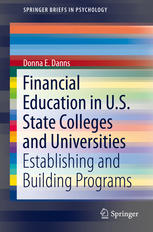

Most ebook files are in PDF format, so you can easily read them using various software such as Foxit Reader or directly on the Google Chrome browser.
Some ebook files are released by publishers in other formats such as .awz, .mobi, .epub, .fb2, etc. You may need to install specific software to read these formats on mobile/PC, such as Calibre.
Please read the tutorial at this link: https://ebookbell.com/faq
We offer FREE conversion to the popular formats you request; however, this may take some time. Therefore, right after payment, please email us, and we will try to provide the service as quickly as possible.
For some exceptional file formats or broken links (if any), please refrain from opening any disputes. Instead, email us first, and we will try to assist within a maximum of 6 hours.
EbookBell Team

4.0
66 reviewsThis book addresses the uncertain state of financial literacy among today’s college students and examines steps colleges and universities are taking to address this widespread concern. This work introduces a four-fold typology of organizational models for college-based financial education programs and uses these as optics for grouping and presenting case studies. The case studies presented provide a holistic representation of how universities develop, sustain and grow financial education programs. Details on the nature of programs, goals, administrative support, resources, partnerships, scale of operations, program content and delivery, advertising, evaluation, program spinoffs, and much more are captured in this work. In addition to detailed case studies, this book presents general findings on the availability of and delivery modes for college-based financial education.
This work has significant utility for universities and colleges seeking to implement new financial education programs, changing existing programs, improving program relevancy or expanding program delivery on campus. It is an important contribution to the experiential understanding on how college students as consumers can acquire financial education as part of their broader college curricula and be able to better manage their financial lives.
Included in the coverage:
The financial literacy imperative.As financial literacy is increasingly recognized as a core life skill, it becomes more crucial as a component of higher education. Personal Financial Education in State Colleges and Universities in the U.S. is salient reading for college and university administrators, researchers, social workers and mental health professionals working with college students, policy analysts and faculty from any discipline interested in promoting the financial literacy of their students.